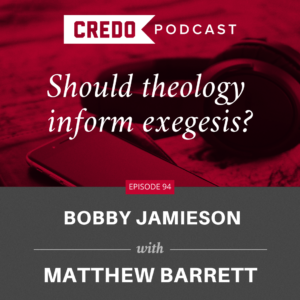Show Notes
W e often approach the Scriptures as if we must keep all that theology out. We might even read the Old Testament as if we should not look ahead to the New Testament, lest we introduce theological doctrines which prejudice our exegesis. But could this approach rob us of those many riches that the history of interpretation has to offer?
e often approach the Scriptures as if we must keep all that theology out. We might even read the Old Testament as if we should not look ahead to the New Testament, lest we introduce theological doctrines which prejudice our exegesis. But could this approach rob us of those many riches that the history of interpretation has to offer?
Creeds are tools that help us interpret the text and see things that we may miss on our own. For example, Christians in the church today can open the scriptures and the Creeds side by side to gain a better understanding of Christ’s divinity and humanity. The Chalcedon definition, for example, serves as a handrail for reading scripture Christologically and keeps us from heresies that could derail biblical Christology itself.
To help us consider how theology should inform biblical exegesis, Bobby Jamieson joins Matthew Barrett on the Credo Podcast to talk about hermeneutics, theological interpretation, Christology in Hebrews, and the relationship between creeds and exegesis.
Bobby Jamieson is an associate pastor of Capitol Hill Baptist Church in Washington, D.C. He is the author, most recently, of The Paradox of Sonship: Christology in the Epistle to the Hebrews (IVP Academic, 2021) and The Path to Being a Pastor: A Guide for the Aspiring (Crossway, 2021).
Matthew Barrett is the author of Simply Trinity: The Unmanipulated Father, Son, and Holy Spirit (Baker). He is the founder and executive editor of Credo Magazine and host of the Credo podcast. He is associate professor of Christian theology at Midwestern Baptist Theological Seminary.
Image Credit: 8926, Pixabay
